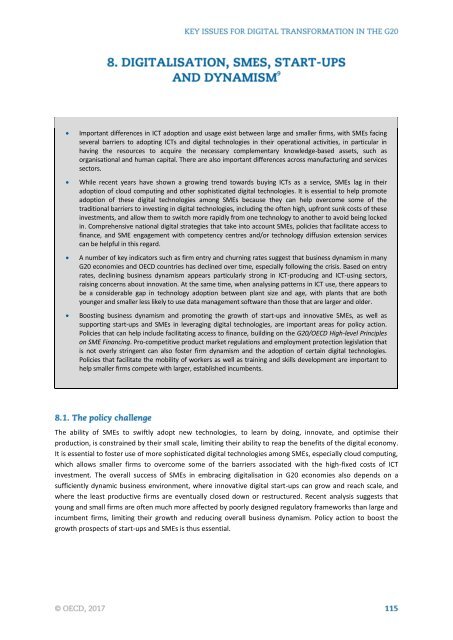KEY ISSUES FOR DIGITAL TRANSFORMATION IN THE G20
2jz0oUm
2jz0oUm
Create successful ePaper yourself
Turn your PDF publications into a flip-book with our unique Google optimized e-Paper software.
Important differences in ICT adoption and usage exist between large and smaller firms, with SMEs facing<br />
several barriers to adopting ICTs and digital technologies in their operational activities, in particular in<br />
having the resources to acquire the necessary complementary knowledge-based assets, such as<br />
organisational and human capital. There are also important differences across manufacturing and services<br />
sectors.<br />
While recent years have shown a growing trend towards buying ICTs as a service, SMEs lag in their<br />
adoption of cloud computing and other sophisticated digital technologies. It is essential to help promote<br />
adoption of these digital technologies among SMEs because they can help overcome some of the<br />
traditional barriers to investing in digital technologies, including the often high, upfront sunk costs of these<br />
investments, and allow them to switch more rapidly from one technology to another to avoid being locked<br />
in. Comprehensive national digital strategies that take into account SMEs, policies that facilitate access to<br />
finance, and SME engagement with competency centres and/or technology diffusion extension services<br />
can be helpful in this regard.<br />
A number of key indicators such as firm entry and churning rates suggest that business dynamism in many<br />
<strong>G20</strong> economies and OECD countries has declined over time, especially following the crisis. Based on entry<br />
rates, declining business dynamism appears particularly strong in ICT-producing and ICT-using sectors,<br />
raising concerns about innovation. At the same time, when analysing patterns in ICT use, there appears to<br />
be a considerable gap in technology adoption between plant size and age, with plants that are both<br />
younger and smaller less likely to use data management software than those that are larger and older.<br />
Boosting business dynamism and promoting the growth of start-ups and innovative SMEs, as well as<br />
supporting start-ups and SMEs in leveraging digital technologies, are important areas for policy action.<br />
Policies that can help include facilitating access to finance, building on the <strong>G20</strong>/OECD High-level Principles<br />
on SME Financing. Pro-competitive product market regulations and employment protection legislation that<br />
is not overly stringent can also foster firm dynamism and the adoption of certain digital technologies.<br />
Policies that facilitate the mobility of workers as well as training and skills development are important to<br />
help smaller firms compete with larger, established incumbents.<br />
The ability of SMEs to swiftly adopt new technologies, to learn by doing, innovate, and optimise their<br />
production, is constrained by their small scale, limiting their ability to reap the benefits of the digital economy.<br />
It is essential to foster use of more sophisticated digital technologies among SMEs, especially cloud computing,<br />
which allows smaller firms to overcome some of the barriers associated with the high-fixed costs of ICT<br />
investment. The overall success of SMEs in embracing digitalisation in <strong>G20</strong> economies also depends on a<br />
sufficiently dynamic business environment, where innovative digital start-ups can grow and reach scale, and<br />
where the least productive firms are eventually closed down or restructured. Recent analysis suggests that<br />
young and small firms are often much more affected by poorly designed regulatory frameworks than large and<br />
incumbent firms, limiting their growth and reducing overall business dynamism. Policy action to boost the<br />
growth prospects of start-ups and SMEs is thus essential.


